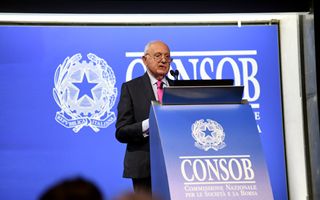(Finance) – “CONSOB is committed for some time to defining an operational and professional plan to face the growing commitments resulting from changes and has the necessary union consultations are underway to launch an organizational reform that: pursues an integrated vision of processes and activities; defines and strengthens supervision based on risk assessment; precisely identify staff tasks and responsibilities; improve the efficiency and effectiveness of its services, containing costs, reducing reporting lines, eliminating duplications and divisions and adapting the organization to new tasks; implement artificial intelligence solutions for the examination of practices.” He stated this Paolo Savona, president of CONSOB (National Commission for Companies and the Stock Exchange), at the annual meeting with the financial market at the headquarters of the Italian Stock Exchange.
To achieve the objectives, “it will be done use of modern information technologies, already foreseen by a multi-year investment plan approved by the Commission, the implementation of which will benefit in part from the funds allocated to CONSOB by the PNRR. It would be of great use and savings for the community if one were achieved shared information collection and processing capacity between securities supervisory institutions within the country and in the Eurosystem, in view of the indispensable definitive transitions to the digital euro and the tokenization of financial instruments. The pursuit of this objective has already begun by participating in the National Strategic Hub, which plans to migrate all strategic data and services of the Public Administration into the national cloud”.
According to Savona, “the effectiveness and efficiency of CONSOB would improve if it came removed the obligation to approve the main operating decisions with a qualified majority of four votes out of five, quorum not foreseen for other independent authorities operating in Italy. It would act in the same direction if, in implementation of the mandate to reform the TUF, the proposals put forward by CONSOB to introduce tools for deflate sanctioning proceduressuch as settlement or the possibility of assessing the relevance of violations, allowing for example – as happens in other sectors – not to initiate burdensome administrative proceedings for minor infringements that cause marginal damage to investors and market transparency”.
“It would also be appropriate align CONSOB’s civil liability with the most advanced foreign systems to understand in which cases the Authority is actually liable for gross negligence, avoiding easy interpretative suggestions which risk excessively amplifying this concept of fault – he explained – there are numerous documents from international bodies on the topic of the existence of a excessive burden of responsibility, extended to situations other than gross negligence and willful misconduct. Finally, it would be useful for the development of our financial market lighten the burden of administrative burdensmaking them converge towards the standards followed by other European markets and the rest of the world, to avoid the negative effects of regulatory competition between countries”.
